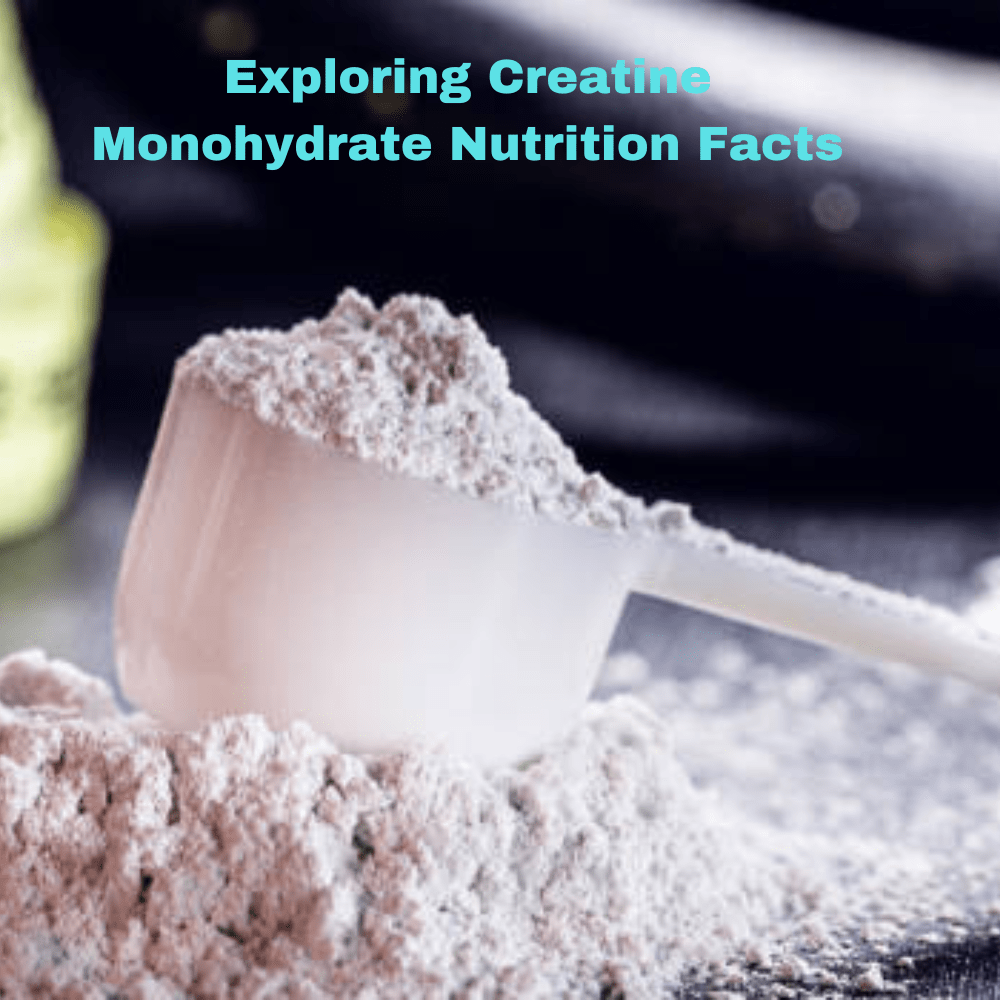Are you curious about creatine monohydrate but need clarification on its nutrition facts and efficacy? You're not alone, as many people need more understanding regarding this widely used supplement.
Creatine has long been surrounded by controversy, with many believing increases muscle strength and size or boosts energy.
In reality, while there is research that supports the use of creatine in certain situations to reach wellness goals, like any supplement, more information is needed before making a decision on whether it's right for you.
This blog post seeks to clear up confusion around creatine monohydrate nutrition facts so that readers can make an informed decision about their health journey.
What is Creatine Monohydrate, and How Does it Benefit Your Health & Physique?
Creatine monohydrate is a natural substance present in the body that helps to supply energy to cells, particularly muscle cells. It's stored within muscle recovery and acts as a readily available form of energy when needed during physical activity.
Some people believe that by taking creatine supplements, they can maximize their workout performance, increase muscle mass and strength, and delay fatigue.
However, research shows that creatine supplementation is only beneficial for those who engage in high-intensity exercises or resistance training.
For others, there may be little to no noticeable benefits.
The Facts about Creatine Monohydrate Nutrition
Creatine monohydrate is available in various forms, such as powder, capsules, tablets, and even liquid. However, the most commonly used form is powder due to its cost-effectiveness and easy absorption by the body.
One of the main benefits of creatine monohydrate is its ability to increase muscle size and strength. Studies have shown that supplementing with creatine can significantly increase muscle mass and strength when combined with resistance training. This is because creatine helps to increase the production of product adenosine triphosphate (ATP), which is the primary source of energy for muscle contractions.
In addition, creatine monohydrate has been found to improve exercise performance and reduce fatigue during high-intensity buy exercises. This is especially beneficial for athletes and individuals who participate in sports that require short bursts of energy, such as sprinting or weightlifting.
While creatine monohydrate has many benefits, it's important to note that there can be potential side effects. These include bloating, stomach discomfort, and muscle cramps. It's also essential to drink plenty of water when supplementing with creatine to avoid dehydration and kidney strain.
Understanding the Ingredients in Creatine Monohydrate Supplementation Products
Creatine monohydrate supplements often come packaged with other ingredients and additives. It's crucial to understand the purpose of these ingredients and their potential impact on your health.
Some common additives found in creatine monohydrate supplements include caffeine, protein powders, and carbohydrates. Caffeine is a stimulant that can enhance focus and calorie energy during workouts, while protein powders provide additional mix amino acids to aid in muscle repair and growth. Carbohydrates, on the other hand, are often used as a source of energy for high-intensity exercises.
While these additives may seem beneficial, it's important to read the label and understand their dosage. Excessive caffeine intake can lead to jitters and increased heart rate, while too much protein or carbohydrates can contribute to weight gain if not utilized through exercise.
Additionally, some creatine monohydrate supplements also contain artificial sweeteners and flavorings. These additives are used to make the supplement more palatable but may have adverse effects on individuals with sensitivities or allergies.
Common Myths and Misconceptions about Creatine Monohydrate
Despite the research and evidence supporting its use, creatine monohydrate continues to be surrounded by myths and misconceptions. Let's debunk some of these common misconceptions:
-
Creatine is a steroid: This is one of the most widely believed myths about creatine. In reality, creatine is a natural substance produced by the body and can also be found in food sources such as meat and fish. It is not a steroid and does not have the same effects on the body.
-
Creatine is only for bodybuilders: While it's true that creatine can benefit those who engage in resistance training, it's not limited to just bodybuilders. As mentioned earlier, anyone participating in high-intensity exercises can see improvements in muscle mass, strength, and performance with creatine supplementation.
-
Creatine is harmful to the kidneys: This myth stems from the misconception that creatine puts a strain on the kidneys. However, research has shown that creatine does not cause any harm to healthy individuals' kidneys when taken in recommended doses and combined with adequate water intake.
-
You only need to take creatine when working out: While it's true that creatine can enhance athletic performance, it also has benefits for non-exercisers. For example, studies have shown that supplementing with creatine can improve cognitive function and mood in individuals with low levels of creatine in their brains.
-
Creatine is only for men: This myth likely stems from the association of creatine with bodybuilding and muscle building. However, research has shown that women can also benefit from creatine supplementation, especially when combined with resistance training.
Is Creatine Monohydrate Safe to Consume
Creatine monohydrate is generally considered safe for consumption when taken within recommended dosages. Studies have shown that serving a daily dose of 3-5 grams can be effective in improving athletic performance and muscle mass.
However, it's essential to note that creatine supplementation may not be suitable for everyone. Those with pre-existing kidney or liver conditions should consult their healthcare provider before starting creatine supplementation. Additionally, individuals under 18 and pregnant or breastfeeding women should also avoid supplementing with creatine.
Furthermore, it's crucial to follow the recommended dosage and not exceed it, as high doses of creatine may lead to potential side effects mentioned earlier, such as bloating and stomach discomfort.
Also, it's important to note that creatine supplementation may not be beneficial for everyone. As mentioned earlier, only those engaging in high-intended exercises or resistance training may see noticed benefits. For others, there may be little to no effect on their athletic performance.
Taking a Balanced Approach
While creatine monohydrate is a popular and effective nutritional supplement, it's essential to take a balanced approach when incorporating it into your diet. This means not solely relying on creatine for your fitness goals but also including other essential nutrients such as protein, carbohydrates, and vitamins.
Protein supplements can help support muscle growth and repair, while carbohydrates provide the necessary energy for workouts. Vitamins and minerals also play a crucial role in overall health and muscle function.
It's best to consult with a healthcare professional or registered dietitian difference to determine the appropriate balance of supplements based on your individual needs and fitness goals.
Also, keep in mind that supplements are meant to complement a healthy diet and regular exercise - they should not be used as replacements. It's vital to maintain a well-rounded approach to nutrition and fitness for optimal results.
FAQs
What is the nutritional composition of creatine?
Creatine monohydrate is a naturally occurring substance in the body and can also be found in food sources such as meat and fish. It does not have a specific nutritional composition, but it is generally considered an important nutrient for muscle growth and performance.
How does creatine supplementation benefit athletic performance?
Studies have shown that creatine supplementation can improve muscle mass, strength, and power output in individuals engaging in high-intensity exercises or resistance training.
Can creatine supplementation have adverse effects?
Creatine supplementation is generally considered safe when taken within recommended doses. However, there may be potential side effects, such as bloating and stomach discomfort, if the dosage is exceeded. Individuals with pre-existing kidney or liver conditions should consult their healthcare provider before supplementing with creatine. Additionally, pregnant or breastfeeding women and those under 18 should avoid creatine supplementation.
Can non-exercisers benefit from creatine supplementation?
While creatine is often associated with athletic performance, research has shown that it can also have benefits for non-exercisers. For example, supplementing with creatine may improve cognitive function and mood in individuals with low levels of creatine in their brains.
Conclusion
In conclusion, Creatine Monohydrate should be a staple in your diet if you are looking to build muscle and have more sustained energy. Its numerous benefits, such as increased strength, resistance to fatigue, improved quality of workouts, and its antioxidant capabilities, make it an invaluable addition to any nutrition plan.
Furthermore, the fact that it has been around for so long means that it has remained relevant as a reliable supplement despite other novel ingredients on the market. So what are you waiting for?
Start exploring what Creatine Monohydrate can do for you today! Allow its wonderful health-promoting properties to unlock the potential within you and strengthen your physical body like never before.









